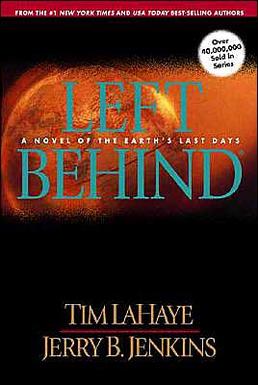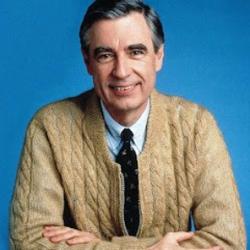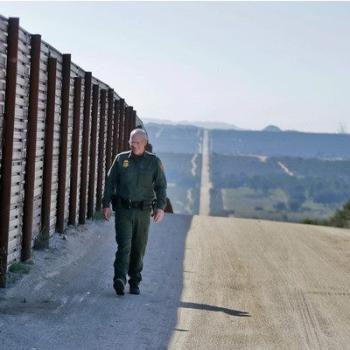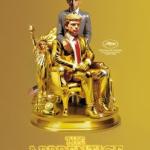(Originally posted December, 2004.)
Left Behind, pg. 68
It was nearly Buck Williams’s turn at the head of the line at the Pan-Con Club counter …
Buck has clawed his way back to the terminal at O’Hare and worked his way into a line at the counter.
This doesn’t really make sense — the airport is clearly closed, it’s runways cluttered with burning wrecks and a still-unknown quantity of its staff vanished or dead. All the airports are obviously closed. Faced with an unprecedented local disaster as well as a mysterious and unprecedented global disaster it hardly seems likely that a Pan-Continental Airlines customer service agent will be able to offer much assistance, so why wait in line to get to the counter?
 Yet this irrational behavior on the part of Buck and the others in line is one of the first things in the book to ring somewhat true. This might actually happen. Faced with an overwhelming, incomprehensible situation and carnage on a massive scale he sees a line of people and a person in uniform with an official-looking badge of some sort at the head of the line. What are they in line for? Who knows? But surely all these people wouldn’t be in line if it weren’t for something important. And if he doesn’t hurry up and grab a spot in line then others will just get there ahead of him.
Yet this irrational behavior on the part of Buck and the others in line is one of the first things in the book to ring somewhat true. This might actually happen. Faced with an overwhelming, incomprehensible situation and carnage on a massive scale he sees a line of people and a person in uniform with an official-looking badge of some sort at the head of the line. What are they in line for? Who knows? But surely all these people wouldn’t be in line if it weren’t for something important. And if he doesn’t hurry up and grab a spot in line then others will just get there ahead of him.
Buck thinks of himself as a man of action, and confronted with the situation before him he acts. He gets in line. Others, frantic, may still be wandering in a panicky daze — We have to do something! Buck is doing something. He’s waiting in line.
It never occurs to the authors, or to Buck, that he might be in any way obliged, as an able-bodied young man, to participate in the desperate rescue efforts going on all around him. On the other hand, back on pages 10-14, Buck Williams personally witnessed an all-out nuclear assault in which the entire Russian arsenal was spent but no one was killed or even injured. After seeing something like that, he may no longer be able to appreciate the significance of a mere few dozen jumbo jetliner crashes.
During that nuclear assault, Buck had kept his wits about him enough to remember that he was a reporter. He observed and reported. But now his only journalistic instinct is to hurry back to the office, ignoring everything that’s happening around him.
Our hero journalist does not behave like either a hero or a journalist. Instead, a bit absurdly, he sets out to charter a private plane by getting into the very long line at the counter of an airline that does not provide such a service.
The further I get in this book, the more Buck reminds me of Arthur Dent from Douglas Adams’ Hitchhiker series. The main difference being that Arthur, at least, realized that he was a confused and selfish man overwhelmed by the absurd events unfolding around him. And Buck, unlike Arthur, really is a jerk, a total kneebiter.
Left Behind, pp. 68-71
Buck Williams’ role as a journalist provides a useful device for long stretches of exposition without departing from the protagonist’s point of view (one of many tropes borrowed from Sydney Watson’s earlier rapture novels).
Jerry Jenkins’ clumsy employment of this device often results in strange passages like this one, in which Buck reviews his notes from an interview with the Magical Jew, Chaim Rosenzweig, wherein the miracleworker discusses an obscure Romanian politician.
It’s a bit odd for Buck to be reviewing this particular section of this particular interview just now. He just received an e-mail from his boss telling him he’s in charge of investigating and reporting on the worldwide mass disappearances. You and I might consider that to be his most urgent priority. The disappearances, after all, are a top candidate for Biggest News Story of All Time.
But neither Buck nor his boss considers this the most important story. The editor is more worried about a pair of Jewish conferences gathering soon in New York City. (Jews in New York — now that’s news.) Steve Plank is convinced those wily Jews are Up To Something and no story is more vital than prying into the secrets of their international conspiracies.
(Inexplicably, the planning of these conferences isn’t even slightly delayed by the mass disappearances and the resulting shutdown of air travel. Even as our hero goes to great lengths and great expense to charter a private plane to NYC, everyone else — Jewish nationalists, Romanian diplomats, members of the Parliament of World Religions — seems able to continue their travel plans to that city without interruption or delay.)
Buck’s own obsession is with the Romanian, mentioned briefly at the end of his boss’s long rant about the Jews. This was the literary equivalent of Roger Ebert’s “Unmotivated Close-up” rule, so Buck astutely realizes that any person thus singled out must be more significant than he at first seems.
Add to this that the man’s name is Nicolae Carpathia. It’s almost impossible to read that without hearing a swell of ominous organ music on the soundtrack. (Frau … Blucher!)
Nicolae Carpathia is, in fact, the Antichrist. This has been made explicitly obvious to the reader, but it’s something that Buck could not yet have any way of knowing. Perhaps this shows his vaunted journalistic instincts at work. Others might see the vanishing of billions of people as the bigger story, but the rise of the Antichrist to worldwide dominion is just as newsworthy — and Buck is onto that story long before anyone else.
By fortuitous coincidence, Buck had already learned a great deal about Carpathia. It turns out that in his interview with Rosenzweig, the doctor had gone off on a tangent about one of his hobbies. When he’s not busy inventing miracle formulas that make the deserts bloom, Rosenzweig apparently likes to study “the lower house of Romanian government.” Who doesn’t?
“Don’t feel bad that you don’t know” such things, Rosenzweig tells Buck:
“… even though you are an international journalist. This is something only Romanians and amateur political scientists like me know. That is something I like to study.”
We’ll get back to Carpathia and what Rosenzweig had to say about him soon, but I need to post this now so I can get back to one of my favorite hobbies. I like to read up on Estonian appellate courts.
NOTE: Linkrot killed the midi file of Bach’s Toccata in Fugue that I included as a link on every mention of the name of Nicolae … Carpathia. So no you’ll just have to imagine ominous organ music playing every time the name is mentioned.

















